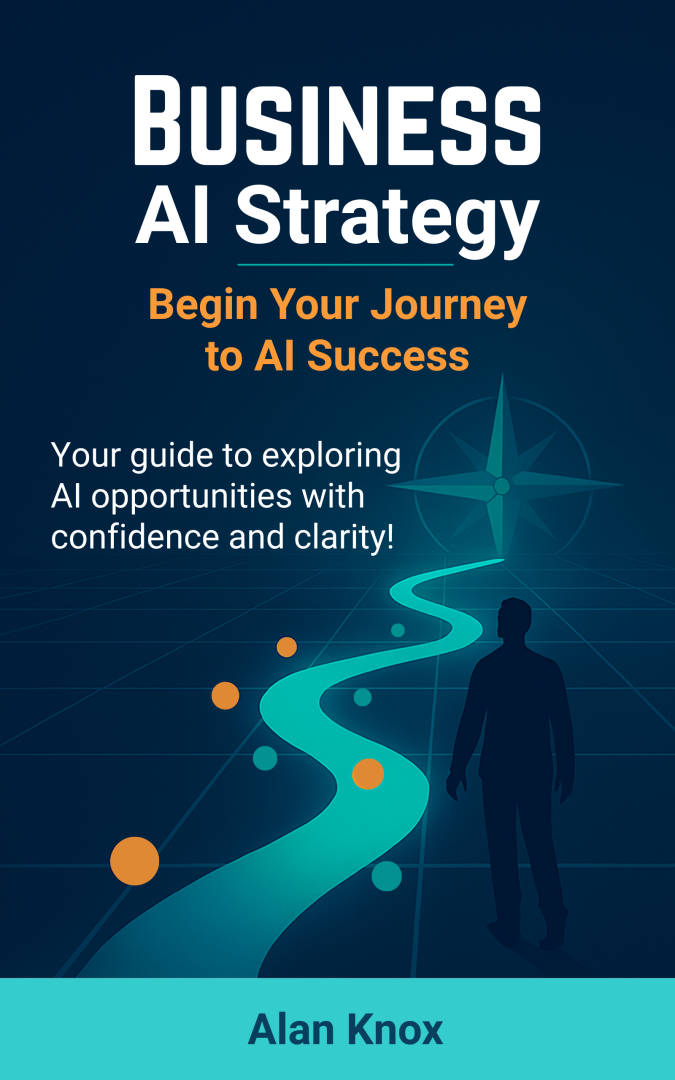Business AI Strategy: Begin Your Journey to AI Success

Your competitive advantage begins with asking the right questions.
Most enterprise AI initiatives fail to deliver measurable business impact. The problem isn’t the technology – it’s the lack of strategy.
Perfect for business leaders who need AI strategy, not technical training. CEOs, department heads, entrepreneurs, and strategic planners will find practical frameworks for making intelligent AI decisions without needing technical expertise.
Business AI Strategy provides the strategic framework that successful companies use to identify where AI can create real business value. Through ten powerful discovery questions, you’ll systematically analyze your challenges, opportunities, and competitive priorities to build an AI strategy that transforms operations and drives growth.
Stop experimenting with AI. Start strategizing with it.
This book helps you:
- Connect AI capabilities to long-term business strategy and market positioning
- Identify AI opportunities that address your most critical business challenges
- Prioritize AI investments based on competitive advantage potential, not technical novelty
- Sequence AI initiatives to build capabilities while delivering measurable results
- Avoid the scattered pilot approach that wastes resources and creates frustration
Buy your copy now!
Chapter Outline
- Understanding the AI Landscape: What We’re Actually Talking About
- The Foundation: Why Strategy Comes First
- Your AI Discovery Journey Map
- Step 1 – What are the biggest challenges slowing your business down right now?
- Step 2 – Where do you spend the most time on repetitive or manual tasks?
- Step 3 – How do your employees or customers currently get answers to questions – and what frustrates them about it?
- Step 4 – If you had a “smart assistant” that could take work off your team’s plate, what jobs would you want it to do first?
- Step 5 – What information do you already collect and use in your business, and what’s hard to find when you need it?
- Step 6 – When it comes to making decisions, where do you wish you had better insights, faster answers, or more consistency?
- Step 7 – How important is it that any AI system gives a clear explanation for its answers, versus just being fast and useful?
- Step 8 – What systems, apps, or tools are most important in your daily operations?
- Step 9 – How do you measure success today – time saved, happier customers, higher revenue, fewer errors?
- Step 10 – Looking 2-3 years ahead, what role do you want technology to play in your business – just a helper, a co-worker, or a driver of new growth?
- Beyond Business Strategy: Technical Questions Your Team Will Need to Address
Frequently Asked Questions
Who is Business AI Strategy for?
Business AI Strategy is written for business leaders, executives, and decision-makers who recognize AI’s competitive importance but feel overwhelmed by the gap between technology hype and practical implementation. It targets leaders who understand their business deeply but lack technical AI expertise, those facing pressure to “do something with AI” without clear direction, and organizations that have attempted AI pilots with disappointing results. The framework is designed for anyone with authority to influence strategic decisions and resource allocation (whether CEOs, department heads, or entrepreneurs) who need to ensure their organization adopts AI strategically rather than reactively.
How long does it take to develop an AI strategy?
Developing a comprehensive AI strategy through the ten strategic questions typically takes several weeks of thoughtful analysis. However, you should have an initial leadership conversation within seven days to convert insights into organizational commitment. The strategy then unfolds in phases: Foundation Building (months 1-6) for quick wins and capability development, Competitive Advantage Development (months 6-18) for strategic differentiation, and Strategic Transformation (months 12-36) for new business models. The key is starting with strategic clarity rather than waiting for perfect conditions.
Why do I need an AI strategy? Can’t I just start implementing AI tools and figure it out as I go?
The “just do it” approach is one of the most expensive mistakes in business AI. Research from MIT found that 95% of enterprise AI pilot programs fail to deliver measurable financial impact, despite $30-40 billion in annual spending. Without strategy, you end up with scattered, disconnected projects that solve minor problems while missing major opportunities. Companies that succeed with AI start with clear business challenges, understand where AI creates real value, and develop roadmaps aligned with their goals. Strategy first means each AI initiative builds toward larger transformation rather than becoming isolated experiments.
Do I need to be technical to develop an AI strategy?
No! The ten strategic questions are business questions, not technical questions. They focus on your challenges, opportunities, workflows, information needs, and competitive positioning. You need to understand your business deeply: what’s holding it back, where time gets wasted, how decisions get made, and what creates competitive advantage. Technical expertise comes later during implementation, often through partnerships with specialized providers who understand your business model.
